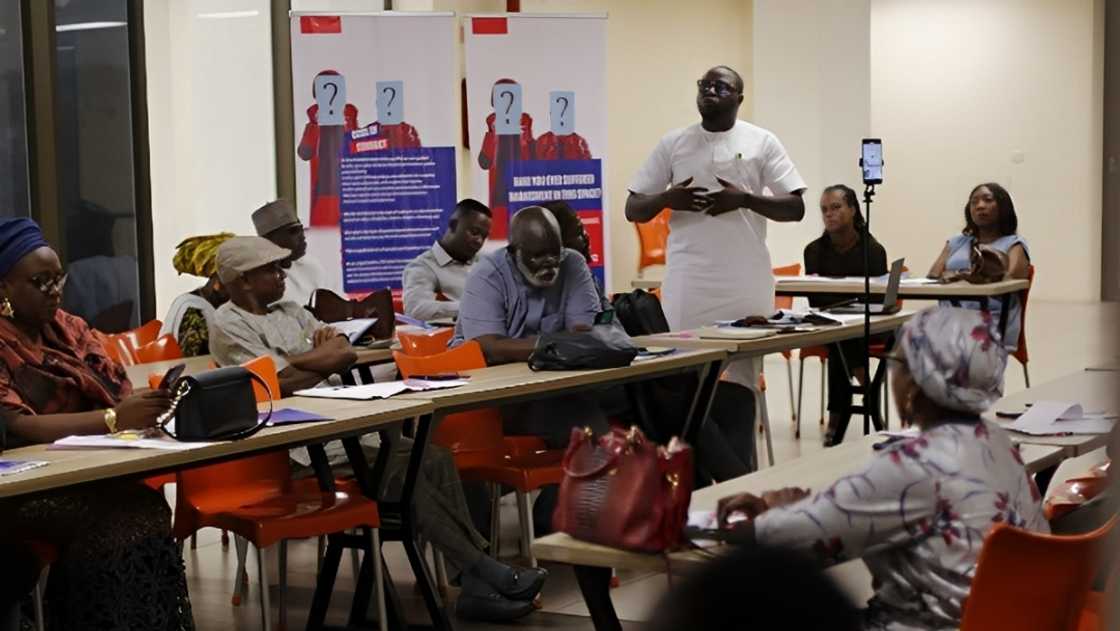Where can a sociologist work in Nigeria? Career options to explore locally
Sociology is the study of how societies function, focusing on behaviour, culture, relationships, and social interactions. So, where can a sociologist work in Nigeria? From government agencies to NGOs and academic institutions, sociology graduates have a wide range of career paths to explore locally.

Source: Getty Images
TABLE OF CONTENTS
- Key takeaways
- Where can a sociologist work in Nigeria?
- What is the best university to study sociology in Nigeria?
- How many years to study sociology in Nigeria?
- What qualifications do sociologists have?
- Where do most sociologists work?
- Can a sociologist work in a bank?
- How much does a sociologist earn in Nigeria?
- Can a sociologist work at the EFCC?
Key takeaways
- A sociologist is a scientist who studies human behaviour, community, and culture, examining how they interact to shape society and contribute to social challenges.
- Experts in this field can work in research fields to solve human problems.
- They can work in government institutions to develop and manage programs that aid social development.
- Sociologists help solve social issues such as crime, justice, gender inequality, and healthcare.
Where can a sociologist work in Nigeria?
The diverse nature of a society makes the scope of work of a sociologist quite expansive. They occupy vital positions in the public and private sectors, as well as research and academic institutions. Here is an overview of where you can work as a sociologist in Nigeria.
1. Academic institutions
Opportunities for these roles can be found in the social science faculties and departments of Nigerian universities. You will also find opportunities in private education companies in Nigeria, such as Alula Learning, Slum2School, Gradely, Edtech.ng, and Naina Tech.
They can also take on academic roles in academic research. In academic institutions, sociologists can work in the following roles:

Source: Getty Images
- Social studies teacher
- Lecturer (assistant and senior lecturer of sociology)
- Professor of Sociology
- Course coordinator
- Academic counsellor
- Curriculum developer
- Curriculum advisor or evaluator
- Education policy analyst
- School community liaison officer
2. Research institutions
Research institutions in Nigeria that require the input of sociologists include the Social Sciences Academy of Nigeria, the Raw Materials Research and Development Council (RMRDC), and the Nigerian Institute of Medical Research.
As researchers, sociologists' expertise provides a unique perspective on human behaviour across various research fields. Research opportunities in social science explore the nature of social problems and how to solve them. These positions include:

Source: Twitter
- Social research officer
- Social policy analyst
- Social program evaluator
- Survey specialist
- Research associate or assistant
- Social demographer
- Monitoring and evaluation officer
- Civic education coordinator
3. Health institutions
In the health sector, sociologists are crucial workers whose roles help mediate the functions of the hospital and patient experiences. From social work to medical training and health policy development, the position of a sociologist can not be undermined.

Source: Getty Images
When looking for work, check out jobs with these titles and see if you fit the bill:
- Health policy analyst
- Social health policy advisor
- Public health officer
- Health promotion officer
- Community health educator
- Behaviour change communication officer
- Health advocacy coordinator
- Medical anthropologist
- Community health engagement officer
- Patient support services coordinator
- Community health social worker
4. Government institutions
For ease of function in government, the public sector has to utilise the expertise of social experts. Key positions in government agencies and ministries include advisory roles, research, policy analysis, and development, as well as community development. Government jobs for sociology majors will often reflect the following titles:

Source: Getty Images
- Community engagement officer
- Social welfare officer
- Social equity advocate
- Policy advisor
- Youth program coordinator
- Health policy analyst
- Education policy analyst
- Gender policy analyst
- Community education officer
- Child protection officer
- Community mobilizer
5. Non-governmental institutions
You can leverage your skills in research, analysis, project management, report writing, and advocacy to become a strong fit for jobs in this sector. NGOs that offer work opportunities for social scientists include Action Against Hunger, Cooperazione Internazionale, Women for Women International Nigeria, and Save the Children Nigeria.
As an expert in this field, you will be required to perform research roles, aid in the development and implementation of programs, enhance social engagement, as well as monitor community development programs. Here are common job titles for sociologists in this field:

Source: Getty Images
- Monitoring and evaluation officer
- Community engagement officer
- Program manager or officer
- Gender and social inclusion officer
- Research and policy analyst
- Community development officer
6. Private sector
In the private sector, sociologists are vital in helping companies understand consumer behaviour. They are also experts in analysing human behaviour and streamlining organisational culture.
To give yourself an edge, ensure you strengthen your tech skills in data analysis and research, communication skills, human resource management, and networking. Common roles in this sector include:

Source: Getty Images
- Human resource manager
- Market research analyst
- Corporate social responsibility officer
- Customer engagement manager
- Data analyst officer
- Public relations officer
- Consultants
- Business analyst
7. Security and intelligence institutions
A sociologist's deep understanding of human behaviour, social and cultural dynamics makes them perfect at promoting peace and preventing conflict. Their roles in such institutions require skills such as networking, conflict resolution, peacebuilding, training, and development.
These roles can be found in the following institutions: the National Intelligence Agency, State Services, the Defence Intelligence Agency, the Force Intelligence Bureau of the Nigerian Police, the Office of the National Security Advisor, and the Nigerian Prison Service.
What is the best university to study sociology in Nigeria?
Various colleges and universities offer sociology as a Bachelor of Arts and a Bachelor of Science course in Nigeria. The social science course can also be studied in both public and private universities, with a general cut-off mark of 140 points.
How many years to study sociology in Nigeria?
In Nigeria, a Bachelor of Sociology degree typically takes about 4 years to complete. However, some universities offer shorter programs for students admitted through Direct Entry, which may take 3 years.
What qualifications do sociologists have?
To become a sociologist, you need to complete a Bachelor's degree in Sociology. The degree provides foundational knowledge and skills, while advanced certificates such as a Master’s Degree or a Doctoral Degree in Sociology offer specialised training and more employment opportunities.
Where do most sociologists work?
Sociologists find employment in fields such as health, education, social research, administration, justice, security, and non-profit organisations. They can work in roles like advisors, researchers, analysts, community organisers, and educators, among others.
Can a sociologist work in a bank?
Yes. A sociologist can provide valuable skills applicable to banking, such as analysis and research. Gaining a sociology degree is the first step to entering finance roles in market research, human resources, diversity, and inclusion.
How much does a sociologist earn in Nigeria?
According to PayScale, a Bachelor of Science Sociology graduate typically earns around ₦1 million annually. This salary can vary depending on factors like experience, location, and the specific type of job a sociologist holds.
Can a sociologist work at the EFCC?
Yes. Sociologists can leverage their skills in understanding social structures, behaviours, and crime patterns to work at the Economic and Financial Crimes Commission (EFCC).
As a sociologist, you can work in various sectors in Nigeria, including educational institutions, healthcare facilities, and the private sector. Sociologists play a vital role, as their expertise helps both public and private organisations better understand human behaviour, needs, and interactions. They also serve as key advocates for human rights, social justice, and equity.
Legit.ng recently published a list of top free job posting sites in Nigeria. Looking for employment can be tiresome. To ease the struggle, it is important to know the right places to do your search.
Subscribing to a paid job posting site is one way of crossing this hurdle. However, several free websites exist to help you start your search without spending anything. Read on to discover free job posting sites in Nigeria.
Source: Legit.ng








